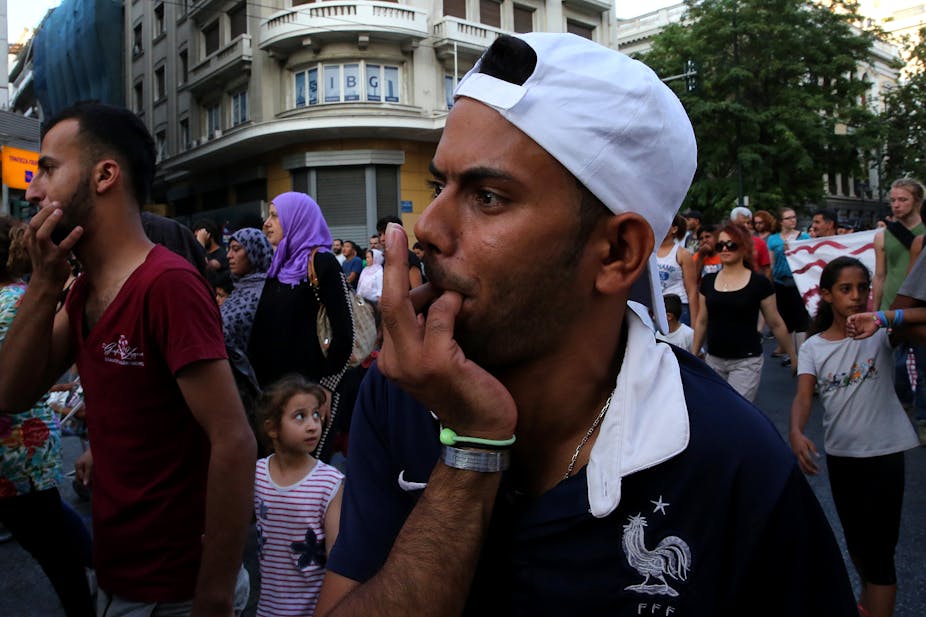In a series of raids on July 27, the Greek police arrested and moved on dozens of migrants and refugees living in squats in the city of Thessaloniki. The clampdown on these squats, which were run by refugees, volunteers and anti-authoritarian groups, is an example of how refugees are being criminalised at the hands of the authorities across Europe.
Some of these migrants and refugees had come from the largest makeshift refugee camp Europe has seen since the end of World War II. The camp, based at Idomeni on the Greek-Macedonian border, was evacuated in May 2016 by Greek police. Thousands of Syrians, Afghans and other refugees of different origins resisted their displacement from Idomeni. They knew that by staying on the border they were highlighting the real international scale of the migration crisis gripping Europe.
The next chapter of this refugee drama moved into Greece’s cities. Upon the closure of the camp at Idomeni, the Greek government, in co-ordination with the EU, UNHCR and international NGOs, began to move people into smaller camps around the country. The majority are situated on the peripheries of Athens and Thessaloniki.
There, contrary to the promises made by the authorities during the relocation in May 2016, neither are the conditions better nor is the pre-registration for the EU’s asylum relocation programme taking place.
As our own ongoing research project is showing, the summer heat in many of these urban camps makes life unbearable. Often the food is insufficient and food markets are too far away. Daily outbreaks of violence among different groups that fight either in competition for the scarce resources or due to their frustration for the uncertainty they experience makes life in these camps dangerous. At the same time, entry for everyone apart from the staff working in camps such as the one at Idomeni is usually prevented by the police and the military who are guarding the periphery.
Now activists and volunteers who have spent the last year carrying out all the tasks necessary for the welfare of refugee populations face increasing difficulties in gaining access to the camps unless they are certified by an approved international NGO.
Squats offer hope
Since September 2015 refugees and migrants began to be offered an alternative to the camps: a refugee shelter squat was set up on 26 Notara Street in Athens. This was organised by groups of refugees together with the organisations No Borders and Refugees Welcome and other anti-authoritarian and left-wing movements. These have been very active in the effort to tackle this humanitarian crisis.
The idea behind the squat was not just to provide shelter but also to provide tools for the refugees to help manage their own lives. The overarching aim was to help the residents regain their humanity by escaping social marginalisation and creating new social bonds. By actively participating in decision-making and everyday tasks regarding the place where they live, migrants and refugees developed avenues to take part in the social and political life of the city. Due to the success of this project, other Greek and international groups followed this strategy and over the last year from Thessaloniki to Amsterdam unused buildings have been appropriated as refugee settlements.
But on July 27, three of these self-organised refugee shelter squats in Thessaloniki were evicted in a mass police operation that aimed to shutdown unofficial shelters for refugees. One of the buildings, a former orphanage, belongs to the Church of Greece. Although the building was abandoned for decades, a few days after its occupation by refugees and activists in December 2015, the local Orthodox Church of Thessaloniki claimed it wanted to demolish it to build a hospice. The evacuation triggered protests against the archbishop of the city who has made xenophobic statements several times in the past.
In the raids, 74 people living in the squats were arrested. The “criminalised” migrants from countries including Morocco, Algeria and Pakistan living in the squats were sent to detention centres. The “legitimate” refugees – for example those from Syria and Iraq – were sent back to their predesignated camps.
Volunteers pushed out
On the one hand, the European and Greek authorities are not effectively helping migrants and refugees. On the other hand, they are cracking down on any alternative self-organised initiatives by refugees and members of the public. So how will the refugees’ welfare be organised?
Only two days after the evictions, it was reported in some Greek media that millionaire and Lionsgate Films founder Frank Giustra intends to open a refugee housing facility in Greece. This news, together with similar philanthropic initiatives, has received plenty of positive publicity and was welcomed by the authorities. It shows how the migrant and refugee crisis gripping Greece is gradually being used to advance a privatisation of welfare, which is being outsourced to philanthropic institutes and other non-state professionals of aid. Volunteers, activists and self-organised refugees are paradoxically excluded.
It looks like this attack against the refugee squats is just part of an effort to create a controllable, gentrified international aid environment. Within this context, the humanitarian aid industry can operate without interruptions from those who expect nothing more in return for their help than friendship and human solidarity.

